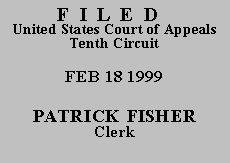

Plaintiff, a prisoner at the Central Utah Correctional Facility in Gunnison,
Utah, appeals the district court's dismissal of his 42 U.S.C. § 1983 action.
Plaintiff's section 1983 action claimed several violations of his constitutional
rights, including the denial of equal protection and due process, retaliation in
violation of the First Amendment, and violations of the Eighth Amendment. In
its report and recommendation filed January 8, 1998, the magistrate judge
recommended dismissing the action as frivolous under 28 U.S.C.
§ 1915(e)(2)(B). The district court adopted the magistrate judge's
recommendation and, on May 13, 1998, dismissed Plaintiff's section 1983 action
as frivolous.
On appeal, Plaintiff claims that the district court erred in dismissing two of
his alleged constitutional arguments. He first argues that prison officials violated
the First Amendment by placing him in administrative segregation for five
months in retaliation for his filing administrative grievances and civil rights
lawsuits. He asserts that the chronology of his grievances attacking prison policy
supports an inference of retaliatory animus sufficient to survive dismissal.
Second, he contends that he was denied equal protection because similarly
situated individuals were not placed in segregation, there was no rational basis
for this unequal treatment, and his claim was not vague and conclusory but met
the requisite standard by stating facts which could support an arguable claim.
After considering the arguments raised in Plaintiff's brief and reviewing
the record and the applicable law, we affirm the district court's dismissal of
Plaintiff's 42 U.S.C. § 1983 action for substantially the same reasons set forth by
the magistrate judge and adopted by district court in its Order filed May 13,
1998, and for additional reasons that we now articulate.
With respect to the retaliation claim, it is well-established that "[p]rison
officials may not retaliate against or harass an inmate because of the inmate's
exercise of his right of access to the courts." Smith v. Maschner, 899 F.2d 940,
947 (10th Cir. 1990) (citing several circuit cases supporting principle that
retaliation for filing lawsuits and administrative grievances violates both the
inmate's right of access to the courts and his First Amendment rights). However,
to withstand dismissal, Plaintiff must plead some facts showing retaliatory
motive. See Frazier v. Dubois, 922 F.2d 560, 562 n.1 (10th Cir. 1990);
cf.
Smith, 899 F.2d at 949 (indicating that to defeat summary judgment, Plaintiff
must present some evidence of retaliatory motive). We agree with the district
court that Plaintiff has not met this burden. Standing alone, some temporal
proximity between Plaintiff's grievance and lawsuit filings and the administrative
segregation does not constitute sufficient circumstantial proof of a retaliatory
motive to state a claim. Cf. Smith, 899 F.2d at 949 (reversing summary
judgment
because "circumstantial evidence of the suspicious timing of [plaintiff's]
discipline, coincidental transfers of his witnesses and assistants, and an alleged
pattern by defendants of blocking his access to legal materials and assistance"
was sufficient to create a jury question on plaintiff's retaliation claim). Aside
from the temporal proximity of Plaintiff's complaint to his discipline, Plaintiff
has made no factual allegation that any of the other circumstances that existed in
Smith occurred here. Moreover, while Plaintiff claims that Defendants imposed
segregation in May 1997 in retaliation for his filing a grievance in March 1997,
we think that Plaintiff's earlier legal filings in 1991 and 1993 negate any
inference of retaliation that may be drawn from temporal proximity.
In addition to the arguments relating to the substance of his appeal,
Plaintiff has requested that this court waive his $105.00 appellate filing fee
because the district court abused its discretion in dismissing his section 1983
action as frivolous. This request is denied and Plaintiff is ordered to continue
making payments to this court in accordance with the Order of the Clerk of the
Court dated September 2, 1998.
For the reasons stated, we AFFIRM the district court's dismissal of
Plaintiff's section 1983 action.
Entered for the Court
Monroe G. McKay
Circuit Judge
*. This order and judgment is not
binding precedent, except under the
doctrines of law of the case, res judicata, and collateral estoppel. The court
generally disfavors the citation of orders and judgments; nevertheless, an order
and judgment may be cited under the terms and conditions of 10th Cir. R. 36.3.
RICHARD LYNN WRIGHT,
Plaintiff - Appellant,
v.
O. LANE McCOTTER; J. TERRY
BARTLETT; HANK GALETKA,
individually; LARRY CHEN,
individually and pursuant to his
respective capacity as an employee of
the Utah Department of Corrections,
Defendants - Appellees.
Before TACHA, McKAY, and
MURPHY, Circuit Judges.
After examining Plaintiff-Appellant's brief and the appellate record, this
panel has determined unanimously that oral argument would not materially assist
the determination of this appeal. See Fed. R. App. P. 34(a)(2); 10th Cir. R.
34.1(G). The case is therefore ordered submitted without oral argument.
Click footnote number to return to corresponding location in the text.
![]() | Keyword |
Case |
Docket |
Date: Filed /
Added |
| Keyword |
Case |
Docket |
Date: Filed /
Added |
![]() (14005 bytes)
(14005 bytes)
![]() (10068 bytes)
(10068 bytes)
Comments to: WebMaster,
ca10 [at] washburnlaw.edu.
Updated: February 19, 1999.
HTML markup © 1999, Washburn University School of Law.
URL: http://ca10.washburnlaw.edu/cases/1999/02/98-4095.htm.